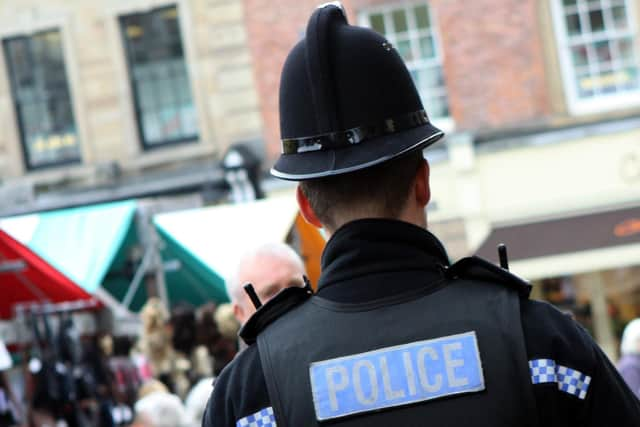This free speech ruling on non-crime hate incidents changes policing for the better – Bill Carmichael
Three senior judges unanimously ruled that the recording of so-called “non-crime hate incidents”, introduced in 2014 and used extensively by police forces, are an unlawful interference with freedom of expression and contrary to Article 10 of the European Convention on Human Rights.
Non-crime hate incidents, or NCHIs as they are known, are indeed an authoritarian abomination that should never have been introduced in the first place.
Advertisement
Hide AdAdvertisement
Hide AdAccording to the definition given by the College of Policing, a NCHI is “any non-crime incident which is perceived, by the victim or any other person, to be motivated by a hostility or prejudice”.


But surely if the police establish that no crime has been committed, then they have absolutely no business continuing the investigation or recording the incident in official records.
Note that this definition is not based on any objective reality, but is entirely driven by subjective perceptions or feelings. No actual evidence of hostility or prejudice has to be produced.
If someone “feels” offended, no matter how unreasonably, it will be recorded as a NCHI.
Advertisement
Hide AdAdvertisement
Hide AdReports of NCHI incidents can stay on your criminal record for six years, possibly affecting job prospects and promotion, and there is no possibility to appeal against them.


Police have used this oppressive tool extensively.
Try and report a burglary or a mugging and you will likely be told the police “don’t have the resources” to investigate.
But there is apparently no end of resources available when it comes to rooting out hurt-y words on Twitter.
And we know there is a vast army of frankly hysterical people out there who are constantly on the lookout for something, anything, to be offended by.


Advertisement
Hide AdAdvertisement
Hide AdAs a result, British police forces recorded around 120,000 non-crime hate incidents between 2014 and 2019 – and many of them are preposterous.
For example a woman joked on Twitter that her cat might be a Methodist. Someone complained that this was a religious hate crime, and it was duly recorded as a NCHI by South Yorkshire Police. In West Yorkshire, a swimming teacher was reported to police after a woman complained her son had been allowed to bang his head against the side of the pool “due to his ethnicity”.
Meanwhile, officers in Bedfordshire recorded a NCHI after a man was reported for whistling the Bob the Builder theme tune at a neighbour.
Someone had to stand up to this nonsense – so step forward Harry Miller, a Lincolnshire businessman and ex-police officer.
Advertisement
Hide AdAdvertisement
Hide AdA single person complained about some allegedly transphobic re-tweets Mr Miller had made, and Humberside Police’s Twitter squad swung into action. An officer visited him at his place of work in order to “check his thinking” and then he was told it was to be recorded as a NCHI.
Mr Miller, who describes himself as “gender critical”, challenged this in the High Court, which ruled in February 2020 that the force’s response was unlawful and a “disproportionate interference” with his freedom of expression.
However a further challenge to the lawfulness of the College of Policing guidance, under which Humberside police had acted, was dismissed.
It was this element of the case which returned to the Court of Appeal this week and the result was an emphatic victory for Mr Miller and a chastening humiliation for the College of Policing.
Advertisement
Hide AdAdvertisement
Hide AdDame Victoria Sharp, one of England’s most senior judges, was withering in her statement. She noted: “The volume of non-crime hate speech is enormous and the police do not have the resources or capacity to investigate all the complaints that are made.”
She went on: “There is nothing in the guidance about excluding irrational complaints, including those where there is no evidence of hostility and little, if anything, to address the chilling effect which this may have on the legitimate exercise of freedom of expression.”
Three cheers for that. Police have more than enough real crime – including rocketing numbers of rape and sexual offences, and high levels of violent crime – to deal with, without spending vast amounts of time and effort chasing around after “non-crimes”.
Perhaps following this judgement we can expect that some semblance of sanity may finally return to the senior ranks of the British police?
Advertisement
Hide AdAdvertisement
Hide AdAnd with that happy thought may I wish all readers a very merry Christmas.
Support The Yorkshire Post and become a subscriber today. Your subscription will help us to continue to bring quality news to the people of Yorkshire. In return, you’ll see fewer ads on site, get free access to our app, receive exclusive members-only offers and access to all premium content and columns. Click here to subscribe.
Comment Guidelines
National World encourages reader discussion on our stories. User feedback, insights and back-and-forth exchanges add a rich layer of context to reporting. Please review our Community Guidelines before commenting.